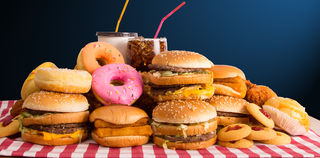Addiction
Six Steps to Stop an Addiction to Sugar and Junk Food
Learn to take a look at this issue for yourself and make changes if necessary.
Posted June 11, 2019 Reviewed by Ekua Hagan

Are you addicted to junk food filled with sugar? Is that even possible? Is addiction driving the obesity epidemic?
Addiction to food is a very controversial issue. There are many strong opinions in the medical field on both sides.
Dr. Nora Volkow, the Director of the National Institute of Drug Abuse, has done extensive research on addiction and obesity. She has concluded that addiction to foods, especially ones high in sugar and fat, is real. She has done extensive research showing that the reward pathways in the brain are disrupted in people who are obese, especially those involving dopamine—sometimes known as the pleasure neurotransmitter.
Dopamine is released when we do pleasurable things like eat, have sex, or use drugs. When people do these things too often, or in larger amounts than normal, the brain adapts and makes it harder to trigger this system. This leads people to use more and more in order to feel good. It leads to a vicious cycle of addiction.
An article in the European Journal of Nutrition reviewed some of the science and concluded that sugar addiction is not real. They claim that binging on so-called comfort foods only occurs in the context of food deprivation. People on this side of the issue say obesity can be controlled by eating in moderation—even junk food every now and then.
Some make the argument that sugar has been around for centuries and people didn’t get “addicted” to it until recently. They claim that something else is to blame for the obesity epidemic, although no one seems to know what that is.
Others point out that “sugar” is no longer sucrose, or table sugar, that our grandmothers used to bake homemade cookies. Instead, it’s highly processed sugars—high fructose corn syrup, dextrose, maltodextrin, and the like. There are also other chemicals and additives in most junk food. These have all been developed by food companies to make their foods more “palatable.”
What does that mean? Some would say it means that it's more addictive. Food companies don’t want us to eat just one. They want us to eat the whole bag and go buy more.
So what does the DSM-5 say? The bible of psychiatric diagnoses, DSM-5, lists many disorders of addiction. It does not include sugar or junk food among them.
However, a new diagnosis that is included is binge eating disorder. This disorder is defined by episodes of binge eating that occurs at least once a week for at least three months. It must include three or more of the following:
- Eating much more rapidly than normal.
- Eating until feeling uncomfortably full.
- Eating large amounts of food when not feeling physically hungry.
- Eating alone because of feeling embarrassed by how much one is eating.
- Feeling disgusted with oneself, depressed, or very guilty afterward.
The full criteria are here.
Does this sound like an addiction? If we replaced the “eating” in these criteria with “consuming alcohol or drugs,” most would see it as an addiction.
Binge eating disorder is now the most common eating disorder. It affects about 3 percent of the United States population. Women are twice as likely to have it as men.
If you feel you are addicted to sweets and junk food, what should you do? Here are six steps to overcoming an addiction to sugar and junk food.
1. Recognize that you have a problem.
This is often easier said than done. When people are addicted to something, they have lots of good reasons to believe that what they are doing is fine. They make all sorts of excuses.
- "I deserve to relax after a hard day’s work. I think I’ll have a snack!"
- "I’ve had an awful day and don’t really care about my health right now. I just need to feel better."
So, what makes it a problem?
- If you are overweight or obese.
- If you eat more than you intend to.
- If you find yourself wanting snacks not because you’re hungry, but because you’re bored, or upset, or happy, or whatever. (The "eating can solve everything" attitude.)
2. Make a plan—cut back or abstain?
Overcoming an addiction is hard work. If you believe that some foods can be addictive for you, it’s probably best to avoid them altogether. We have learned with other addictive substances, like alcohol, that abstinence works best.
Part of the cycle of addiction is the lack of control. Once you get started, you can’t stop. People end up eating or drinking more than they plan to. Acknowledging this lack of control is important.
However, we all hear the message that everything in moderation is fine. If you want to give moderation a chance, go for it. It’s important to set some concrete goals and see how you do. If you’re trying to cut back, make a plan for how much. Make it measurable. For example, only have three cookies for dessert two nights per week.
If your goal is abstinence, be clear with yourself about what you plan to abstain from. For example, I won’t have any cookies this week. This leaves open opportunities for other desserts, but that’s OK in the beginning. Alternatively, your goal might be “no dessert” for the week.
If your goal is too broad and nonspecific, such as “I’ll be good this week and lose some weight,” it’s hard to make specific plans for how to accomplish this. The more detail you can add to your plan, the better.
3. Remove temptation.
We ask alcoholics to clear their homes of alcohol so that they can’t easily start drinking at their first craving. Sure, they can always go out and buy more. But for many people, putting some distance between the urge to do something and actually being able to do it can be helpful. In the 15 minutes that it takes to drive to the liquor store, the craving can go away. People can get a hold of themselves and drive back home.
This same advice goes for addictive foods.
4. Have a plan for cravings and triggers.
It’s important to think about what drives you to eat addictive foods.
- Is it stress?
- Is it work?
- Is it loneliness?
All of these things and others are common triggers. When people feel bad, they want to do something to feel better. Food can serve this purpose.
However, although overeating can make you feel better in the moment, in the long run, it can lead to many problems—obesity, diabetes, heart disease, and most importantly, depression. This last one is important because it creates a never-ending cycle. You eat to feel better. It works in the short run. But in the long run, the overeating makes you more depressed. That, in turn, makes you want to eat more.
5. Track results.
Come up with a way to track your goals. It could be entering the data in your calendar. There are numerous apps out there to help. You can go with an old-fashioned pencil and paper.
No matter what—be accountable and track your progress. Track things that matter to you, such as:
- Staying away from certain foods.
- Losing weight.
- Feeling better.
If at the end of the week, you find that you forgot to track, it probably means that you also forgot your goals. Take this as a warning.
Tracking gives you an opportunity to observe what you’re doing and think about it. It also gives you an opportunity to see if your goals are leading to desired outcomes, such as feeling better or losing weight.
6. Get help.
If you just can’t seem to do any of this—if it seems too overwhelming or hopeless—please get help.
In particular, if you have an eating disorder, such as binge eating disorder, bulimia, or anorexia, you may feel you are “addicted” to foods. Unfortunately, it’s very difficult to overcome an eating disorder on your own. For some, they can be deadly. Professionals are available to help.
Disclaimer: Nothing in this post is intended as medical advice. People with health conditions are urged to seek medical care from a competent medical provider. No doctor-patient relationship is created by this article, or by any responses to comments posted in this forum by Chris Palmer, M.D.




